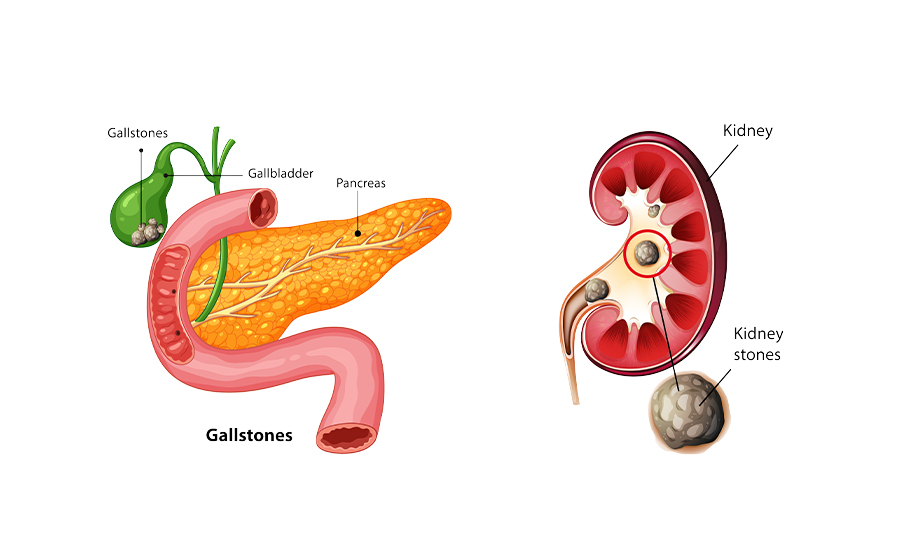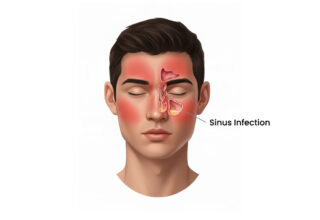Have you ever had a sharp pain on the side or upper part of your abdomen and wondered “could it be stones?”. You’re not alone. Gallstones and kidney stones are two common stones that are formed in your body and may cause severe pain. Their names may sound similar but they affect entirely different organs in your body and have different causes, symptoms, and treatment approaches.
Let’s break it down and take a closer look at what sets gallstones and kidney stones apart.
What are Gallstones?
Gallstones or gallbladder stones are formed in your gallbladder — which is a small pear-shaped organ tucked beneath your liver. It is part of your digestive system and its job is to store and release bile, which is a fluid that helps digest fats. Sometimes the components of bile — bilirubin and fats — clump together and form stones, known as gallstones.
These stones can be small as a grain of sand or large as a golf ball. You might have just one or several at a time. Many people with gallstones don’t have any symptoms. But when a stone blocks the bile duct, it can cause sudden and severe pain.
What are Kidney Stones?
Kidney stones, on the other hand, are formed in your kidneys, which are part of your urinary system. They filter waste from your blood and produce urine (pee). These stones are made of minerals and salts— like calcium, oxalate, or uric acid— that crystallise and stick together.
Just like gallstones, kidney stones may also vary in size. Some pass through your urinary system unnoticed, while others can get stuck and cause excruciating pain. They cause severe pain especially when they’re trying to pass through your ureters, which are tubes that connect your kidneys to the urinary bladder.

Key Differences Between Gallstones vs Kidney Stones:
|
Feature |
Gallstones |
Kidney Stones |
|
Where they form |
Gallbladder (digestive system) |
Kidneys (urinary system) |
|
What they’re made of |
Mostly bilirubin or cholesterol |
Calcium, oxalate, uric acid, etc. |
|
Pain location |
Upper right abdomen or middle back |
Lower back, side, or lower abdomen |
|
Pain type |
Comes in waves, often after eating, and may radiate to right shoulder or back |
Sharp, stabbing pain that may radiate to the groin |
|
Associated symptoms |
Nausea, vomiting, indigestion |
Frequent urination, blood in urine |
|
Common triggers |
Fatty meals, obesity, pregnancy |
Dehydration, high salt/ protein intake |
What Are the Symptoms of Gallstones?
You might have gallstones and don’t even know it — many people don’t experience any symptoms. But if the stone gets stuck in the bile duct, it can block the flow of bile and cause noticeable symptoms like:
- Sudden pain in the right upper abdomen or centre of your belly
- Pain that radiates to the right shoulder or back
- Nausea or vomiting, especially after eating
- Bloating or feeling full
- Pain that comes and goes (biliary colic), often triggered by fatty meals
What Are the Symptoms of Kidney Stones:
Kidney stones symptoms can vary depending upon the size of the stone. Larger stones usually cause more severe symptoms.
Common ones include:
- Sharp , cramping lower back pain, often radiating to the groin
- Lower abdominal or side pain
- Painful or frequent urination
- Blood in the urine (pink or reddish tint)
- Nausea or vomiting
- Foul-smelling urine
- Feeling an urgent need to pee even if little comes out
- Fever
- Chills
What Causes Gallstones?
The exact cause of gallstones isn’t always clear. The most common causes include:
- Gallbladder doesn’t empty properly (which can cause bile to become concentrated leading to formation of crystals)
- Excessive bilirubin (bile pigment) or cholesterol in the bile
- Low bile salts in the bile
Other factors that increase your risk of developing gallstones are:
- Female gender
- Age above 40
- Obesity
- Pregnancy
- Rapid weight loss
- Taking cholesterol lowering-drugs
What Causes Kidney Stones?
Kidney stones usually don’t have one specific cause. But there are many factors that can increase your risk of developing them:
- Not drinking enough fluids
- Diet high in sodium, protein, or oxalate-rich foods (like spinach or nuts)
- Certain medical conditions like parathyroidism
- Urinary tract infections (UTIs)
Treatment for Gallstones:
If gallstones aren’t causing any symptoms, they may not need any treatment. When they do cause symptoms, these are the treatment options available for them:
- Medications may be used in a few cases to dissolve gallstones. But they can take a long time (months) to work and are not a permanent solution.
- It is common for gallstones to recur, so removal of the gallbladder through surgery is a good option for many people. It is also done laparoscopically and is considered a routine surgery.
Treatment for Kidney Stones:
Kidney stones treatment largely depends on the size and location of the stone. If the stone is small, your doctor might simply recommend you to drink plenty of water to help flush it out naturally.
In some cases medications may be prescribed to reduce the acid in urine to make it easier to pass the stone.
However, if the stone is large, causing intense pain, or complications like an infection, a surgical procedure might be necessary. Common treatment options include:
- Shock-wave lithotripsy: It is a non-invasive method in which sound waves are used to break the stone into smaller pieces and make it easier to pass through urine.
- Ureteroscopy: In this procedure, a thin, flexible instrument called an endoscope is inserted through the urethra to locate and remove the stone.
- Nephrolithotomy: In more complex cases, a small incision is made to access the kidney directly and remove the stone through a tube from skin to the kidney.
The Bottom Line:
Gallstones and kidney stones can both be very painful, but understanding their difference helps you to respond appropriately when the symptoms strike. The good news? Both are manageable and often preventable with the right lifestyle choices and medical care.
If you suspect you might be dealing with gallstones or kidney stones, talk to your doctor and take steps to protect your health.








